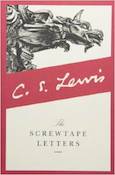The Screwtape Letters
Sedate old Oxford with its accent, its dons and its gowns sometimes has its moments. Some dull mathematician like Dodgson of Christ Church elopes with an Alice through a looking-glass into Wonderland and gambols with Jabberwocky and slithy toves; or a Rhodes Scholar turns Communist.
This time it is a perfectly respectable and even orthodox fellow of his college—Magdalen, where choirboys sing from the top of the tower like angels—who has been having the time of his life, like Dante, hobnobbing—be-live it or not—with devils in Hell.
The English have bailed this fantasy with the rapture that, some years ‘ago, they lavished on the equally polite and deadly Letters of Junius who cursed the statesmen of his day with the courtesy of a chairman at a dinner who would like to poison the guest of the evening. C. S. Lewis has been hailed as the last of the great freaks, the true successor of Dean Swift if, indeed, any successor to Swift be conceivable.
On the title-page of the book there is no concession to what is inside it. The Screwtape Letters, written to his nephew, Wormwood, might be anything written to anybody. There is no hint that Screwtape is the name of a diabolical being ranking in intellectual ability with Milton’s Beelzebub, and that Wormwood is his agent on earth whose instructions are to prevent people getting converted to Christianity. Even Machiavelli was not quite so convincing as this in his role of Old Nick. For Machiavelli, whatever the means that he recommended, was all right, more or less, as to ends. But Screwtape and Wormwood make no secret that human misery is their aim in life—to them the war is “a brimful living chalice of despair and horror and astonishment,” to be enjoyed with every sip of its intoxicating elixir.
The possible convert whose un-fortunate impulses are to be counteracted is described as the “patient.” The authority over the church becomes the enemy,” and the struggle between Screw-tape and “the enemy” is dis-cussed as the German High Command might analyze the conduct and prospects of the war against democracy and decency. All that is good spells defeat, evil is the only victory.
The volume has suited the well-bombed British who regard it as a backhanded volley that wins the point for religion. What the New World will think of it re-mains to be seen. The interpretation of psychological diagnosis as the strategy and tactic of the nether regions is too clever and artful to be dismissed as low-brow. It is too audacious to be disliked as “pie-jaw.” Possibly it might be defined as pre-Catholic Chestertonianism. Yet even Chesterton never identified himself quite so successfully as does Mr. Lewis with the devious processes of the diabolical mischief-makers.
“The devil,” said Thomas More, “cannot endure to be mocked,” and which, if correct, means that somewhere in the inferno there must he considerable annoyance.
Book Review from The New York Times, by P.W. Wilson (3/28/1943)
Tags: C.S. Lewis, The Screwtape Letters
- The Author

C.S. Lewis
Clive Staples Lewis (1898-1963) was one of the intellectual giants of the twentieth century, and arguably one of the most […] More about C.S. Lewis.
- Books by the Author
- Related Articles

Mere Christianity
C.S. Lewis’ masterful work Mere Christianity has long been regarded as a classic of Christian writings. It is notable for […]
Ratings Details

















